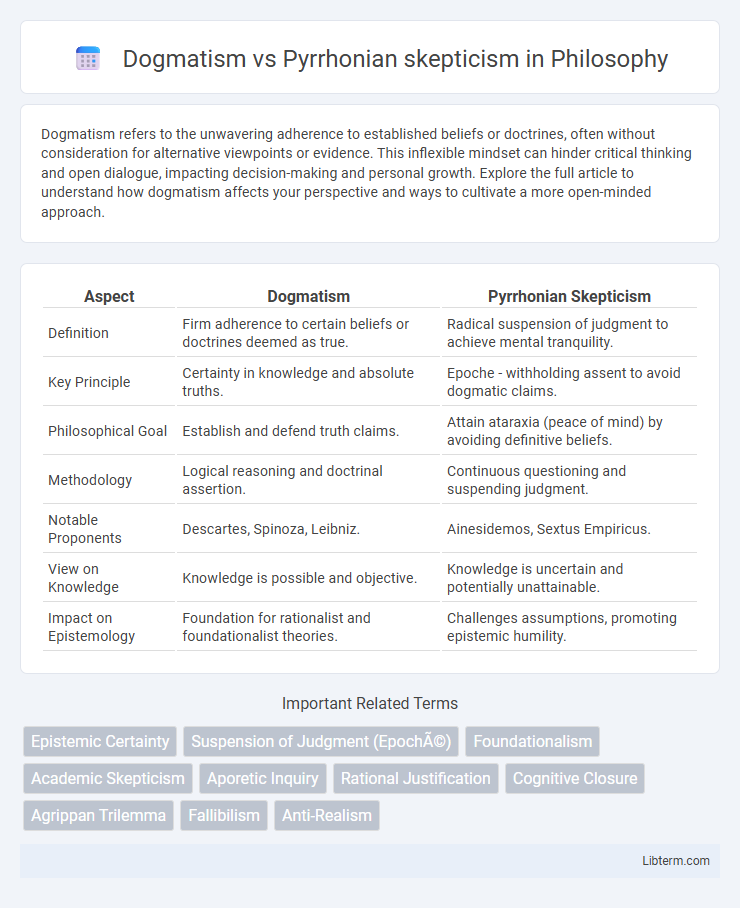Dogmatism refers to the unwavering adherence to established beliefs or doctrines, often without consideration for alternative viewpoints or evidence. This inflexible mindset can hinder critical thinking and open dialogue, impacting decision-making and personal growth. Explore the full article to understand how dogmatism affects your perspective and ways to cultivate a more open-minded approach.
Table of Comparison
| Aspect | Dogmatism | Pyrrhonian Skepticism |
|---|---|---|
| Definition | Firm adherence to certain beliefs or doctrines deemed as true. | Radical suspension of judgment to achieve mental tranquility. |
| Key Principle | Certainty in knowledge and absolute truths. | Epoche - withholding assent to avoid dogmatic claims. |
| Philosophical Goal | Establish and defend truth claims. | Attain ataraxia (peace of mind) by avoiding definitive beliefs. |
| Methodology | Logical reasoning and doctrinal assertion. | Continuous questioning and suspending judgment. |
| Notable Proponents | Descartes, Spinoza, Leibniz. | Ainesidemos, Sextus Empiricus. |
| View on Knowledge | Knowledge is possible and objective. | Knowledge is uncertain and potentially unattainable. |
| Impact on Epistemology | Foundation for rationalist and foundationalist theories. | Challenges assumptions, promoting epistemic humility. |
Introduction to Dogmatism and Pyrrhonian Skepticism
Dogmatism asserts the possibility of certain knowledge and the existence of objective truths that can be definitively known, often grounded in established doctrines or philosophical systems. Pyrrhonian skepticism, by contrast, advocates suspending judgment to achieve mental tranquility, emphasizing continuous inquiry and withholding assent to all non-evident propositions. This fundamental difference highlights dogmatism's commitment to asserting claims versus Pyrrhonian skepticism's commitment to persistent doubt and epistemic humility.
Historical Origins and Philosophical Foundations
Dogmatism, rooted in ancient Greek philosophy with figures such as Plato and Aristotle, asserts the possibility of certain knowledge through reason and empirical observation. Pyrrhonian skepticism, founded by Pyrrho of Elis in the 4th century BCE, challenges the certainty of knowledge by emphasizing suspension of judgment (epoche) and the pursuit of tranquility (ataraxia). These contrasting philosophical foundations illustrate dogmatism's confidence in epistemic claims and Pyrrhonian skepticism's radical doubt aimed at avoiding cognitive disturbance.
Core Principles of Dogmatism
Dogmatism centers on the belief that certain knowledge or truths are attainable and can be known with certainty, emphasizing firm adherence to established doctrines. It asserts that reality is knowable through reason or experience, promoting confidence in human cognitive abilities to acquire definitive answers. This approach contrasts sharply with Pyrrhonian skepticism, which suspends judgment to avoid dogmatic assertions and embraces uncertainty as a core principle.
Key Tenets of Pyrrhonian Skepticism
Pyrrhonian skepticism emphasizes suspending judgment (epoche) on all beliefs to achieve mental tranquility (ataraxia) by recognizing the equal weight of opposing arguments. Its key tenets include the rejection of dogmatic assertions about truth, embracing continuous inquiry without committing to any fixed conclusions. This approach contrasts sharply with dogmatism, which asserts certainty and absolute knowledge.
Methods of Inquiry: Certainty vs Suspension of Judgment
Dogmatism asserts that knowledge can be attained through definitive principles, relying on fixed beliefs and unwavering certainty as the foundation for inquiry. Pyrrhonian skepticism employs radical suspension of judgment (epoche), refraining from affirming or denying any proposition to achieve mental tranquility (ataraxia). This method systematically challenges all beliefs, thereby avoiding dogmatic commitments and emphasizing continuous inquiry without claiming absolute certainty.
Epistemological Implications and Knowledge Claims
Dogmatism asserts the possibility of certain knowledge, relying on fixed beliefs as epistemic foundations, whereas Pyrrhonian skepticism suspends judgment to avoid epistemic commitments, challenging the justification of knowledge claims. The epistemological implications of dogmatism include a confidence in absolute truths, potentially leading to epistemic rigidity, while Pyrrhonian skepticism promotes continuous inquiry and openness, emphasizing the limits of human cognition. This contrast highlights fundamental debates on epistemic certainty, with dogmatism endorsing definitive knowledge and Pyrrhonian skepticism fostering ongoing doubt and epistemic humility.
Impact on Ethics and Moral Reasoning
Dogmatism asserts fixed moral truths, providing a stable foundation for ethical decision-making but potentially limiting openness to alternative perspectives. Pyrrhonian skepticism challenges certainty in moral knowledge, promoting continuous inquiry and tolerance by suspending judgment on ethical claims. This dynamic influences moral reasoning by balancing commitment to principles with critical examination of moral assumptions.
Critiques and Counterarguments
Dogmatism faces critique for its rigid adherence to unchanging beliefs, often ignoring empirical evidence and alternative viewpoints. Pyrrhonian skepticism counters dogmatism by emphasizing suspension of judgment (epoche) and continuous inquiry, arguing that certainty is unattainable and promotes mental tranquility (ataraxia) through doubt. Critics of Pyrrhonian skepticism argue that radical doubt may lead to epistemic paralysis, making practical decision-making difficult, while proponents maintain its value in avoiding dogmatic error and fostering open-mindedness.
Influence on Contemporary Philosophy
Dogmatism's rigid assertion of certain knowledge contrasts sharply with Pyrrhonian skepticism's suspension of judgment, profoundly shaping contemporary epistemology and analytic philosophy. Pyrrhonian skepticism's emphasis on ongoing inquiry and withholding assent has influenced movements like evidentialism and fallibilism, promoting critical examination of beliefs. Meanwhile, dogmatism's challenges have spurred debates on foundationalism and certainty, driving epistemic theories that balance conviction with doubt in modern philosophical discourse.
Conclusion: Relevance in Modern Thought
Dogmatism asserts fixed beliefs and truths, whereas Pyrrhonian skepticism promotes continual inquiry and suspension of judgment, encouraging intellectual humility. In modern thought, Pyrrhonian skepticism's emphasis on questioning assumptions proves invaluable in scientific, philosophical, and ethical debates, fostering open-mindedness and adaptability. The tension between dogmatism and skepticism shapes contemporary discourse on knowledge, belief systems, and the pursuit of certainty.
Dogmatism Infographic

 libterm.com
libterm.com